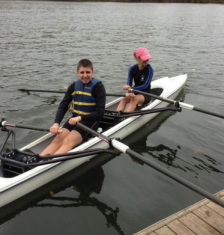Rowperfect remote coaching adviser, Jason Dorland, follows up his successful podcast interview with an article about what parents should look for in a coach for their child.
When Jason and I talked on RowingChat I asked him about how to spot whether a coach is athlete-focused or in it for self-promotion. He gives specific advice in this article written at our request.
As a parent—what should I look for in a coach for my child?
Sadly, we live in a time where parents have to arrange and often pay—a lot of money—for
>their child to be involved in sport. In our day, we simply met at the local playground towing bats, balls, gloves and sticks where a pickup game of our choosing soon followed—and we biked on our own the get there! Today—not so much. Many parents have to rely on community leagues to create opportunities for their children to not only get enough exercise, but also experience the beneficial life-lessons that can be garnered through sport.
>Whether you’re a parent whose child is simply looking for something to do after school or you have the next Wayne Gretzky or Christine Sinclair living in your home, there’s one factor that’s constant—a coach.
>WHERE TO BEGIN:
>Given the power of influence that many coaches have over their athletes, it’s imperative that we as parents do our due-diligence when selecting who’s going to be mentoring our child—especially given those impressionable years.
>When parents have asked me about selecting a coach for their children, it’s interesting that they often preface their question with, “We’re just looking for a fun and positive experience—we’re not looking to go to the Olympics, or anything!”
>I find it fascinating that somehow the two would look different? That pursuing high performance should open the door to questionable coaching strategies that generate results but don’t serve the well-being of our youth. Regardless of whether or not your child has world-class aspirations, positive coaching experiences are integral to an outcome that not only creates wholesome memories, but also supports reaching athletic potential.
>Yes, coaches need to be educated, trained and certified from their respective governing sport body. Of course they must be respectful of every athlete, parent, coach, referee and judge they encounter. And, under no circumstances should you ever tolerate an abusive coach.
>However, if I were to create a “must-have” list—these four would be absolute.
- >What’s the coach’s philosophy on winning? As a coach who has evolved from a win-at-all-costs approach to competition to one that’s more grounded in process, I can vouch for the importance of this requirement. It’s imperative that parents determine if the coach in question is willing to compromise the physical, mental and emotional well-being of your child in the name of winning. Winning is fun. I won’t deny that. However, it’s not the only reason we should encourage our children to participate in sport. The other benefits far outweigh momentary glimpses of celebration. Remember that studies show the number one reason that youth leave sport is because of an over-emphasis on winning by their respective coaches. If fun doesn’t come up in your conversation with the coach—move on.
- >Would you identify the coach as a potential role model for your child? For some this may seem of lesser importance. However, it’s a significant contributing factor to the breadth of influence the coach is crafting. If the lifestyle of a coach isn’t congruent with what he or she demands from their athletes—in my books, it’s a deal breaker. As adults, there’s a reason we’re challenged to listen to bosses or managers we don’t respect. Our children are no different. If you find it hard to listen to someone who asks you to do things that they clearly don’t do themselves, why would you expect your child to respond any differently? Basically, what you’re trying to determine is does the coach walk-the-talk—do they represent the values that you want your child being exposed to every time they head off to a practice or game?
>“Yes, it sounds incredibly judgmental, but this is your child we’re talking about. In many cases, coaches take on parent-like influence—don’t compromise!”
- Will your son or daughter feel completely safe to screw-up? Having been asked many times, “What’s the most important role of a coach?”—this one is easy! Athletes, like all of us, must feel safe to fail. I was encouraged a few weeks ago when Mike Babcock was hired to be the Toronto Maple Leafs new head coach. And, not just because I’m a Leaf’s fan! During his first press conference, he referred to the importance of athletes feeling safe in order to achieve their ultimate potential. For me, that reference speaks to a shift in the coaching world by acknowledging that all athletes, professional or amateur, have the same hard-wired experience of fear and shame. It’s our human-condition. Therefore, the safer we can make our athletes feel, the more they will grow, thrive and ultimately shine. When I coached rowing, what I saw as the most important job each day was ensuring that when our rowers showed up at 4:00 and left at 6:30, they felt better about themselves than when they arrived. The end result was a culture based around intrinsic motivation—a deep-down yearning to want to participate in sport because it makes you feel so good. That’s a power place from which to develop athletes and build teams. However, in order to achieve that, individuals must feel safe. If your child ever shows signs of fear when heading off to a practice or game—that’s a red flag!
- >And, finally, what’s the legacy your potential coach aspires to? I would want to know why the coach has chosen to commit their time—free or paid—to working with athletes. I believe one’s desired legacy should be the unwavering directive behind anyone’s chosen path. In the case of coaching—my experience tells me that why someone coaches and how they coach undoubtedly speaks to how they’ll be remembered. So, the question begs—how do they want to be remembered? It’s a fair question, and it’s one you should ask. Essentially, what you’re trying to determine is—do they coach for your child or for them? If it’s the latter, keep searching!
>THE OPPORTUNITY:
>Today, I believe that most coaches are genuinely selfless individuals who truly enjoy giving back to a sport that served them in their youth, and we should applaud and encourage that sort of participation.
>I’ve been presenting at coaching conferences throughout North America for close to a decade. In that time I’ve seen a shift towards a more holistic and athlete centered approach to coaching. The old-school methods that I grew up with are slowly dying out as a new generation of coaches enters the ranks. It’s exciting to see the change. However, like all things worth changing, there’s still more work to be done.
>When parents take ownership of their child’s experience in sport, it ensures that all coaches are held accountable. When you respectfully determine if a coach is right for your child, it only serves to better the coach and more importantly ensure that your child’s athletic experiences will be grounded in healthy, meaningful and fun choices.
>Jason Dorland is a High-Perfomance Coach who believes the most undervalued and underutilized components of reaching our goals are the mental and emotional areas of our lives. With your commitment, Jason can help you make a positive difference in how you approach your life’s dreams and goals. Guaranteed! Hire Jason







